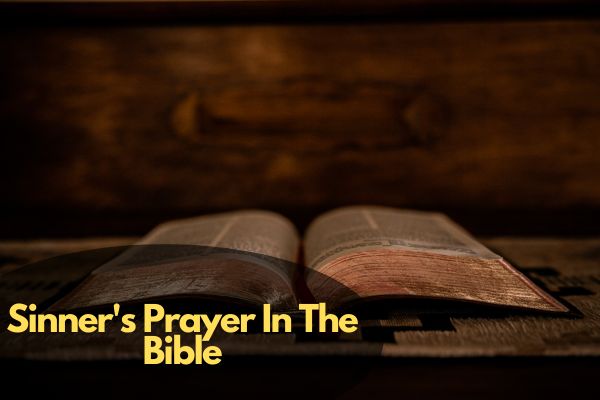Embarking on a spiritual journey often involves reflection, repentance, and a sincere desire for transformation. In the realm of Christian faith, the “Sinner’s Prayer In The Bible” stands as a poignant expression of these profound sentiments. This article is a comprehensive exploration of the Sinner’s Prayer, diving into its scriptural foundation, and the transformative impact it has had on countless lives.
Sinner’s Prayer In The Bible
As we navigate through the intricacies of this sacred prayer, we will unravel its significance, address common misconceptions, and share personal stories that highlight its powerful influence on individuals seeking spiritual redemption. Get ready to immerse yourself in a journey that transcends time and denominations, as we dissect the Sinner’s Prayer In The Bible, seeking to understand its depth, purpose, and the unwavering faith it represents.
The Significance of the Sinner’s Prayer
- Understanding the profound significance of the Sinner’s Prayer is crucial.
- It serves as a gateway to spiritual transformation, allowing individuals to express repentance and seek salvation.
How to Pray the Sinner’s Prayer
The Sinner’s Prayer is a Christian prayer that is often used as a way for individuals to express repentance and a desire for salvation. It is not a specific scriptural formula but is based on biblical principles. Here is a general guide to the steps involved in praying the Sinner’s Prayer:
- Acknowledge Your Sinfulness: Begin by acknowledging your need for forgiveness and recognizing your shortcomings or sins. This step involves genuine self-reflection and a humble admission of your imperfections.
- Confess Your Sins: Confess your sins to God. Be specific and honest about the things you believe are wrong or have separated you from a relationship with God. This is an essential part of repentance.
- Express Sincere Repentance: Repentance involves a change of heart and a commitment to turn away from sinful behaviour. Express your sincere desire to change and live a life that aligns with God’s teachings.
- Believe in Jesus Christ: Acknowledge and believe in Jesus Christ as the Son of God and the Savior of humanity. Recognize His sacrificial death on the cross as atonement for your sins and how you can be reconciled with God.
- Invite Jesus into Your Life: Invite Jesus to come into your heart and life. This is a symbolic way of expressing your willingness to follow Him and allow Him to guide your thoughts, actions, and decisions.
- Accept God’s Gift of Salvation: Acknowledge that salvation is a gift from God, not something earned through good deeds. Understand and accept that through faith in Jesus Christ, you can be forgiven and receive eternal life.
- Pray the Sinner’s Prayer: While there is no fixed formula for the Sinner’s Prayer, it may include elements such as confessing your sinfulness, expressing repentance, believing in Jesus Christ, and inviting Him into your life. You can use your own words or follow a suggested prayer, adapting it to reflect your personal understanding and commitment.
Remember, the sincerity of your heart is crucial in this process. The Sinner’s Prayer is a personal expression of faith, and genuine repentance and belief are essential components of this spiritual journey. If you have access to a local church or spiritual mentor, consider reaching out to them for guidance and support on your newfound faith.
Scriptural Basis
While the specific phrase “Sinner’s Prayer” is not explicitly found in the Bible, the foundational concepts behind it are drawn from various biblical passages that emphasize repentance, confession of sins, and faith in Jesus Christ. The Bible provides the theological basis for the Sinner’s Prayer, and here are some key verses that relate to its components:
- Recognition of Sin:
- Romans 3:23 (NIV): “For all have sinned and fall short of the glory of God.”
- 1 John 1:8 (NIV): “If we claim to be without sin, we deceive ourselves and the truth is not in us.”
- Confession of Sins:
- 1 John 1:9 (NIV): “If we confess our sins, he is faithful and just and will forgive us our sins and purify us from all unrighteousness.”
- Psalm 32:5 (NIV): “Then I acknowledged my sin to you and did not cover up my iniquity. I said, ‘I will confess my transgressions to the LORD.’ And you forgave the guilt of my sin.”
- Repentance:
- Acts 3:19 (NIV): “Repent, then, and turn to God, so that your sins may be wiped out, that times of refreshing may come from the Lord.”
- Luke 15:7 (NIV): “I tell you that in the same way, there will be more joy in heaven over one sinner who repents than over ninety-nine righteous persons who need no repentance.”
- Belief in Jesus Christ:
- John 3:16 (NIV): “For God so loved the world that he gave his one and only Son, that whoever believes in him shall not perish but have eternal life.”
- Acts 16:31 (NIV): “They replied, ‘Believe in the Lord Jesus, and you will be saved—you and your household.'”
- Inviting Jesus into Your Life:
- Revelation 3:20 (NIV): “Here I am! I stand at the door and knock. If anyone hears my voice and opens the door, I will come in and eat with that person, and they will be with me.”
- John 1:12 (NIV): “Yet to all who did receive him, to those who believed in his name, he gave the right to become children of God.”
- God’s Gift of Salvation:
- Ephesians 2:8-9 (NIV): “For it is by grace you have been saved, through faith—and this is not from yourselves, it is the gift of God—not by works, so that no one can boast.”
- Romans 6:23 (NIV): “For the wages of sin is death, but the gift of God is eternal life in Christ Jesus our Lord.”
Common Misconceptions
addressing misconceptions is important to foster a clear understanding of the Sinner’s Prayer. Here are some common myths and clarifications:
- Myth: The Sinner’s Prayer is a Magical Incantation for Automatic Salvation.
- Clarification: The Sinner’s Prayer is not a magical formula. It is a sincere expression of repentance, faith, and a desire to follow Christ. Salvation involves a genuine transformation of the heart and a lifelong commitment to living by Christian principles.
- Myth: Saying the Sinner’s Prayer Guarantees a Trouble-Free Life.
- Clarification: Accepting Christ through the Sinner’s Prayer doesn’t exempt individuals from life’s challenges. The Christian journey involves growth, trials, and perseverance. Faith is a source of strength and guidance through difficulties, but it doesn’t eliminate them.
- Myth: The Sinner’s Prayer is the Only Way to Salvation.
- Clarification: While the Sinner’s Prayer can be a meaningful expression of faith, it’s not the only way to experience salvation. Different Christian traditions may emphasize various approaches to salvation and genuine faith in Jesus Christ is the central theme.
- Myth: Reciting Specific Words Is More Important Than Genuine Repentance.
- Clarification: The sincerity of the heart is crucial. Merely reciting words without genuine repentance and belief lacks the transformative power intended by the prayer. It’s not about the specific words used but the authenticity of one’s commitment to Christ.
- Myth: Once You Say the Sinner’s Prayer, You Can Live However You Want.
- Clarification: The Sinner’s Prayer is not a ticket to live without regard for moral principles. True repentance involves a desire to turn away from sinful behaviour and align one’s life with God’s teachings. It’s an ongoing process of growth and sanctification.
- Myth: The Bible Prescribes a Specific Sinner’s Prayer Word-for-Word.
- Clarification: The Bible doesn’t provide a specific script for the Sinner’s Prayer. The prayer is a personal expression of faith, often incorporating elements of confession, repentance, belief in Jesus, and an invitation for Him to be Lord of one’s life.
- Myth: The Sinner’s Prayer Is a One-Time Event with No Further Significance.
- Clarification: While the initial prayer can be a significant moment, the Christian journey is ongoing. It involves continual growth, prayer, and seeking a deeper relationship with God. The Sinner’s Prayer is a starting point for a life of faith, not a conclusion.
Addressing these misconceptions helps individuals approach the Sinner’s Prayer with a more accurate understanding of its purpose and significance in the context of the Christian faith.
Impact on Personal Spirituality
The lasting impact of the Sinner’s Prayer on personal spirituality can be profound, bringing about transformative effects that touch various aspects of an individual’s life. Here are some ways in which the Sinner’s Prayer can leave a lasting impact:
- Renewed Sense of Purpose:
- Impact: The act of praying the Sinner’s Prayer often marks a significant turning point in a person’s life. It can bring a renewed sense of purpose, as individuals commit to living per their newfound faith. This can lead to a reevaluation of priorities, goals, and values.
- Forgiveness and Liberation from Guilt:
- Impact: The Sinner’s Prayer provides an avenue for confessing sins and seeking forgiveness. This experience can be liberating, lifting the burden of guilt and shame. The assurance of God’s forgiveness can lead to a sense of freedom and a fresh start in one’s spiritual journey.
- Deepened Connection with God:
- Impact: Through the Sinner’s Prayer, individuals express a desire for a personal relationship with God. This can result in a deepened sense of connection through prayer, meditation, and the study of scriptures. The ongoing relationship with God becomes a source of guidance, comfort, and spiritual growth.
- Transformed Character and Behavior:
- Impact: The sincerity of the Sinner’s Prayer is often accompanied by a genuine desire for transformation. Over time, individuals may experience changes in character and behavior as they seek to align their lives with the teachings of their faith. This transformation can positively affect relationships, decision-making, and ethical choices.
- Sense of Peace and Assurance:
- Impact: Praying the Sinner’s Prayer can bring about a profound sense of peace and assurance. Believers often find comfort in the knowledge that they are reconciled with God through faith in Jesus Christ. This assurance can provide stability and resilience in the face of life’s challenges.
- Participation in a Faith Community:
- Impact: Many individuals who pray the Sinner’s Prayer seek to connect with a faith community. Engaging with a church or religious group allows for fellowship, support, and shared spiritual experiences. Being part of a community can further enhance one’s sense of belonging and purpose.
- Evangelical Outreach and Sharing Faith:
- Impact: Those who have experienced the transformative power of the Sinner’s Prayer may be inspired to share their faith with others. This can lead to engagement in evangelical activities, outreach, and a desire to bring the message of salvation to those who have not yet heard.
- Hope for the Future:
- Impact: The Sinner’s Prayer often instills a sense of hope for the future. Believers may find comfort in the promise of eternal life and a positive outlook grounded in their faith. This hope can be a guiding force, influencing attitudes and responses to life’s uncertainties.
Sinner’s Prayer In The Bible – A Verse-by-Verse Analysis
The concept of the Sinner’s Prayer is based on biblical principles related to salvation, repentance, and faith in Jesus Christ. While the term “Sinner’s Prayer” is not explicitly mentioned in the Bible, its components can be traced to various key verses that are central to Christian theology. Here is a comprehensive analysis, exploring these key verses and their significance:
- Recognition of Sin:
- Key Verse: Romans 3:23 (NIV) – “for all have sinned and fall short of the glory of God.”
- Significance: This verse underscores the universal condition of humanity—everyone is in need of salvation because all have sinned. Acknowledging one’s sinful state is the first step toward understanding the need for redemption.
- Confession of Sins:
- Key Verse: 1 John 1:9 (NIV) – “If we confess our sins, he is faithful and just and will forgive us our sins and purify us from all unrighteousness.”
- Significance: Confession is a crucial aspect of repentance. This verse emphasizes God’s faithfulness in forgiving sins when confessed, leading to purification and reconciliation.
- Repentance:
- Key Verse: Acts 3:19 (NIV) – “Repent, then, and turn to God, so that your sins may be wiped out, that times of refreshing may come from the Lord.”
- Significance: Repentance involves a turning away from sin and toward God. Acts 3:19 highlights the transformative nature of repentance and the refreshing renewal it brings.
- Belief in Jesus Christ:
- Key Verse: John 3:16 (NIV) – “For God so loved the world that he gave his one and only Son, that whoever believes in him shall not perish but have eternal life.”
- Significance: This foundational verse encapsulates the essence of Christian faith—believing in Jesus Christ as the means of salvation and the source of eternal life.
- Inviting Jesus into Your Life:
- Key Verse: Revelation 3:20 (NIV) – “Here I am! I stand at the door and knock. If anyone hears my voice and opens the door, I will come in and eat with that person, and they with me.”
- Significance: This imagery from Revelation emphasizes the personal nature of inviting Jesus into one’s life—a symbolic expression of a desire for fellowship and a relationship with Christ.
- Acceptance of God’s Gift of Salvation:
- Key Verse: Ephesians 2:8-9 (NIV) – “For it is by grace you have been saved, through faith—and this is not from yourselves, it is the gift of God—not by works, so that no one can boast.”
- Significance: Salvation is a gift of God’s grace, received through faith in Jesus Christ. This verse underscores that it is not earned through human effort but is a result of God’s unmerited favor.
- Transformation and New Life:
- Key Verse: 2 Corinthians 5:17 (NIV) – “Therefore, if anyone is in Christ, the new creation has come: The old has gone, the new is here!”
- Significance: Becoming a new creation in Christ is the transformative outcome of salvation. This verse highlights the radical change that occurs in a person’s life through faith in Jesus.
- Assurance of Salvation:
- Key Verse: Romans 10:9 (NIV) – “If you declare with your mouth, ‘Jesus is Lord,’ and believe in your heart that God raised him from the dead, you will be saved.”
- Significance: This verse assures salvation through a simple confession of faith in Jesus as Lord and belief in His resurrection.
Conclusion
In the realm of faith, the Sinner’s Prayer In The Bible emerges not merely as words spoken but as a profound catalyst for spiritual metamorphosis. As we conclude this exploration, we stand witness to the diverse ways in which this prayer has touched hearts, bridged denominational gaps, and served as a universal conduit for repentance and salvation.
May this journey through the Sinner’s Prayer inspire introspection, foster a deeper connection with one’s faith, and bring solace to those in search of redemption. Let the transformative power of this prayer resonate within, echoing the timeless truth that, in moments of sincere repentance, the divine awaits with open arms. Embrace the journey, cherish the revelations, and let the Sinner’s Prayer In The Bible be a guide toward a renewed and steadfast spiritual connection.






